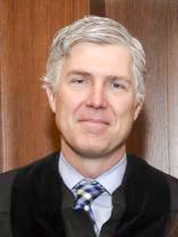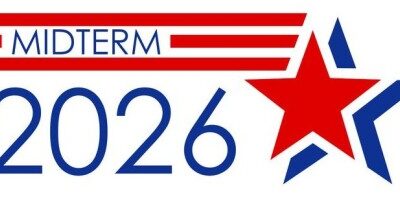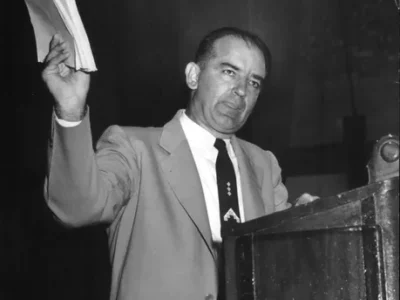Predicting How Neil Gorsuch Would Rule on Environmental Issues
If he’s ever confirmed by the U.S. Senate
 Donald Trump just announced his nomination to replace Justice Antonin Scalia. Here are some very preliminary thoughts.
Donald Trump just announced his nomination to replace Justice Antonin Scalia. Here are some very preliminary thoughts.
Assuming Trump’s nominee, Neil Gorsuch, is confirmed by the U.S. Senate (by no means a certainty), what do we know about how he would be likely to rule on environmental questions? As far as I can tell, he does not have a huge environmental record as a judge on the U.S. Court of Appeals for the 10th Circuit (though he is, of course, the son of Ronald Reagan’s first, highly controversial administrator of the Environmental Protection Agency, Ann Gorsuch Burford). Gorsuch has written opinions in at least two cases, however, that are important harbingers of how he might approach cases on the Supreme Court.
By far the most important is his concurring opinion in Guittierez-Brizuela v. Lynch. The Guittierez-Brizuela case involved how to reconcile two seemingly incompatible statutes regarding the status of an undocumented immigrant. Not only were the two statutory provisions seemingly incompatible but prior to the Guittierez-Brizuela case, a court (Gorsuch’s own 10th Circuit) had reconciled them in one direction and an agency – the Board of Immigration Appeals — had reconciled them in a different direction. In yet another case decided before Guittierez-Brizuela, the 10th Circuit applied the canonical Chevron v. NRDC decision to say that, given the statutory ambiguity and the agency’s interpretation, it would defer to the agency’s “reasonable” interpretation of the statute even though the 10th Circuit had interpreted the statutes differently in an earlier case. The case actually gets even more complicated but the issue of how to apply Chevron in these circumstances prompted a concurring opinion from Judge Gorsuch.
In the concurring opinion, Gorsuch takes on the question of whether courts should defer to an agency interpretation of an ambiguous statute. That question is at the heart of the Chevron opinion and the Supreme Court has, since the issuance of the decision in 1984, said yes, deference is appropriate so long as the agency’s interpretation is “reasonable.” Judge Gorsuch does not believe that such deference should be due (although as a court of appeals judge must follow Supreme Court doctrine). In his concurring opinion he laid out his view that Chevron is wrong. Here is his central concern:
But the fact is Chevron and Brand X [another case involving agency interpretations of statutes] permit executive bureaucracies to swallow huge amounts of core judicial and legislative power and concentrate federal power in a way that seems more than a little difficult to square with the Constitution of the framers’ design.
…Chevron seems [to be] a judge-made doctrine for the abdication of the judicial duty. Of course, some role remains for judges even under Chevron. At Chevron step one, judges decide whether the statute is “ambiguous,” and at step two they decide whether the agency’s view is “reasonable.” But where in all this does a court interpret the law and say what it is? When does a court independently decide what the statute means and whether it has or has not vested a legal right in a person? Where Chevron applies that job seems to have gone extinct.
Of course environmental law is filled with places where the implementing agency — typically the Environmental Protection Agency but not always — must interpret ambiguous statutory provisions. The question of whether EPA’s interpretation of the provision under which EPA issued the Clean Power Plan, Section 111d of the Clean Air Act, is reasonable, for example, is at the heart of pending legal challenges to the Clean Power Plan. EPA’s burden is to show that its interpretation is “reasonable.” The agency need not show that its interpretation is the best one or the only one, only that it is a reasonable one. Thus a repudiation of Chevron deference would mark a sea change in administrative and environmental law, a sea change that current justices on the Supreme Court have not embraced. Whether Gorsuch could persuade some of his colleagues to reconsider Chevron is not at all clear. But his concurring opinion certainly suggests that he would not defer to agency interpretations even if Chevron remains good law since he could simply stake out his own position on the high Court.It is hard to know what a repudiation would mean for environmental agencies because we don’t know exactly how a Justice Gorsuch would interpret ambiguous texts. But agencies have an enormously difficult task in trying to figure out what kinds of rules and regulations to issue when a statute is ambiguous. They spend enormous resources engaging in rule making, soliciting input from regulated parties, public interest organizations and others to try to enact rules and regulations that can be upheld in court. The big fear many observers have if Chevron is overturned is that it would make agency rule making even more difficult, more uncertain and more vulnerable to legal challenge. That would be bad news for environmental protection. I should also add that in my — and many others’ view — the Chevron doctrine makes eminent sense. Agencies have far more expertise than judges and have been delegated authority by Congress to use that expertise to implement complex statutes. But the substantive debate about whether Chevron is good or bad is a debate beyond my scope here.
We also know that, like the justice he would replace, Antonin Scalia, Gorsuch considers himself an “originalist” and an advocate of using only the text of a statute to interpret it rather than sources like legislative history. Typically, though not always, this judicial philosophy conveniently leads to highly conservative results. Justice Scalia was a ferverntly anti-environmental justice and used his judicial philosophy to strike down or otherwise object to numerous environmental regulations. We don’t know whether Gorsuch shares Scalia’s anti-environmental impulses (though we do know that Gorsuch lives in Boulder, is a fly fisherman and is a skier so he may be less hostile to environmental issues than Scalia was). But it is also worth nothing that sometimes “textualism” can lead to unpredictable results, as when Justice Scalia held in Whitman v. American Trucking that the Clean Air Act prevents EPA from taking costs into account when setting National Ambient Air Quality Standards. Moreover, were Gorsuch called on to weigh in on a Trump EPA’s interpretation of an environmental statute, one would guess that he would strike down anti-enviornmental interpretations that seem inconsistent with — or highly unlikely interpretations of — statutory language.
The second important opinion that Gorsuch has authored is ELEnergy and Environmental Legal Institute v. Epel. In that case, out-of-state coal producers challenged a Renewable Portfolio Standards the State of Colorado enacted to require its utilities to purchase or otherwise procure 20 percent of their electricity from renewable sources like wind and solar. Colorado’s electricity system is connected to the Western Interconnect (a multi-state transmission system that covers most of the western region of the country) and receives some of its power from out of state. The coal producers argued that the Colorado standard interferes with interstate commerce under a doctrine known as the dormant Commerce Clause because it discriminates against out of state businesses. Judge Gorsuch rejected the claim and upheld the renewable portfolio standard.
His opinion probably says more about Gorsuch’s views about the dormant Commerce Clause than it does about environmental policies more generally. The dormant Commerce Clause is not really a clause at all but instead an implicit limitation on state power to interfere with or discriminate against interstate commerce (I’ve described it in more detail here). It stems from the Commerce Clause, contained in Article I of the U.S. Constitution. Interestingly, two conservative Supreme Court justices, Clarence Thomas and the late Antonin Scalia, have argued that the dormant Commerce Clause doesn’t exist given that it is not included in the text of the Constitution. As Thomas has written, “the so-called ‘negative’ Commerce Clause is an unjustified judicial intervention, not to be expanded beyond its existing domain.” Judge Gorsuch may share this view — his Colorado RPS case takes as a given that the dormant Commerce Clause must be applied because the 10th Circuit is bound by existing Supreme Court doctrine but he suggests skepticism about whether such a doctrine should exist:
Detractors find dormant commerce clause doctrine absent from the Constitution’s text and incompatible with its structure. See, e.g., Comptroller of Treasury of Md. v. Wynne, 135 S. Ct. 1787, 1808 (2015) (Scalia, J., dissenting); Hillside Dairy, Inc.
v. Lyons, 539 U.S. 59, 68 (2003) (Thomas, J., concurring in part and dissenting in part). But as an inferior court we take Supreme Court precedent as we find it and dormant commerce clause jurisprudence remains very much alive today, as but a glance at this term’s slip opinions will confirm.
If Judge Gorsuch does not, in fact, believe in the dormant Commerce Clause, several state policies that potentially raise Commerce Clause issues, like Renewable Portfolio Standards, could have a friend on the high Court. But these are a relatively limited set of policies and, again, don’t tell us much about how Gorsuch would rule on other environmental issues.
Overall, then, we don’t have an extensive environmental record to evaluate in predicting what kind of a justice Gorsuch would be on environmental matters. Given his stated conservative judicial philosophy and his supposed commitment to “textualism,” though, it seems safe to be that he’ll be a reliable conservative vote and a foe of environmental protection most of the time.
Reader Comments
6 Replies to “Predicting How Neil Gorsuch Would Rule on Environmental Issues”
Comments are closed.






On Chevron, I never understood why step one was necessary.
Step one is necessary at least in theory to ensure that where a court believes that statutory language is clear, courts and not agencies are responsible for interpretation and construction. I suspect Judge Gorsuch would stop the analysis at step zero. Courts, not agencies, would interpret and construe all ambiguous or unambiguous statutory language with no, or virtually no, deference to agency interpretation and construction. But see Jim Rossi’s comment for some other possibilities and questions about what Judge Gorsuch would do in replacing Chevron.
Ann said;
“….. Given his stated conservative judicial philosophy and his supposed commitment to “textual-ism,” though, it seems safe to be that he’ll be a reliable conservative vote and a foe of environmental protection most of the time……”
Dear Ann;
Thanks for your well-written essay on Judge Gorsuch. The Judge does not need to become a foe of environmental rules because President Trump is on course to fix and correct the most serious problems such as the Clean Power Plan.
Our hopes for Judge Gorsuch are vested in his Christian morals and keen intellect which will help us overturn the ugly travesty of so-called “gay marriage.”
Ann –
I don’t have much to add to your terrific and well-written assessment. But a couple of follow-up observations come to mind:
1) In addition to rejecting Chevron (or at least refining), it is also clear that Gorsuch would not support Auer/Seminole Rock deference, which might end up being more significant in terms of cases that make it to SCOTUS. (He has joined some 10th Circuit opinions that refuse to apply it.) His lack of support for Chevron/Brand X/Auer raises the question of what would replace them. Would Gorsuch really endorse the Skidmore’s multifactor approach to deciding what weight to an agency interpretation? This seems to leave judges enormous discretion and that could produce multiple interpretations of statutes/regulations across circuits — and what would Gorsuch’s trusted advisor James Madison think of this? Or would he prefer to treat issues art Chevron step one or to merge the step one and step two inquiries into arbitrary and capricious review based on statutes/regulations? Given his concurrence these are fair question for Senators to put to him in confirmation hearings.
2) Epel not only reaches the right result. To his great credit it clarifies dormant commerce clause doctrine in some important ways — perhaps even better than the much-celebrated 9th Circuit opinion on the same topic. Specifically, it tells us that he thinks the “extraterritority” strand of dormant commerce clause analysis (applied in one of the multiple 8th Circuit opinions rejecting Minnesota’s law) is not really an independent doctrine but instead is just a part of Philadelphia’s anti-discrimination doctrine. I am convinced that this is the best doctrinal approach and is also a positive development for state experimentation. To the extent state and local governments will need to carry more of the torch for climate and environmental initiatives this gives them more space than some other recent federal court cases, even some that are celebrated for upholding state initiatives.
4) Also, on overruling the dormant commerce clause, in Federalist 39 Madison seemed to endorse having a tribunal such as the Supreme Court police the boundary between the union and the states. Again, if Gorsuch thinks that the dormant commerce clause is suspicious, or that it should be overruled, what does he think replaces it? Maybe it’s just statutes, as interpreted by courts (or maybe it’s the privileges and immunities clause?), but given the paragraph you quote from Epel Gorsuch should be pressed in confirmation hearings to address this question and how, as Supreme Court justice, he would police boundaries related to federalism.
Jim
Thanks, Jim. I especially agree with your comment on Epel bringing a nice dose of clarity to the dormant Commerce Clause arena, especially with respect to the extraterritorially approach. The opinion is well-written and clear, something Gorsuch has been appropriately praised for.
I also agree with your Chevron comments and would very much like to know whether he thinks agency expertise is worth anything in interpreting statutes. Wonder if he’d feel differently if he’d actually had to deal with complex statutory programs like the CAA and CWA.
The other serious concern I have about his view of separation of powers is about his apparent belief in a robust non-delegation doctrine. He may believe that Mistretta was incorrectly decided and that an “intelligible principle” provided by Congress is not enough to warrant delegation of legislative power to agencies. At the extreme, it’s possible he could believe that many existing statutory provisions, or agencies’ interpretation of their authority flowing from those provisions, violates the doctrine. Another line of questioning worth exploring.